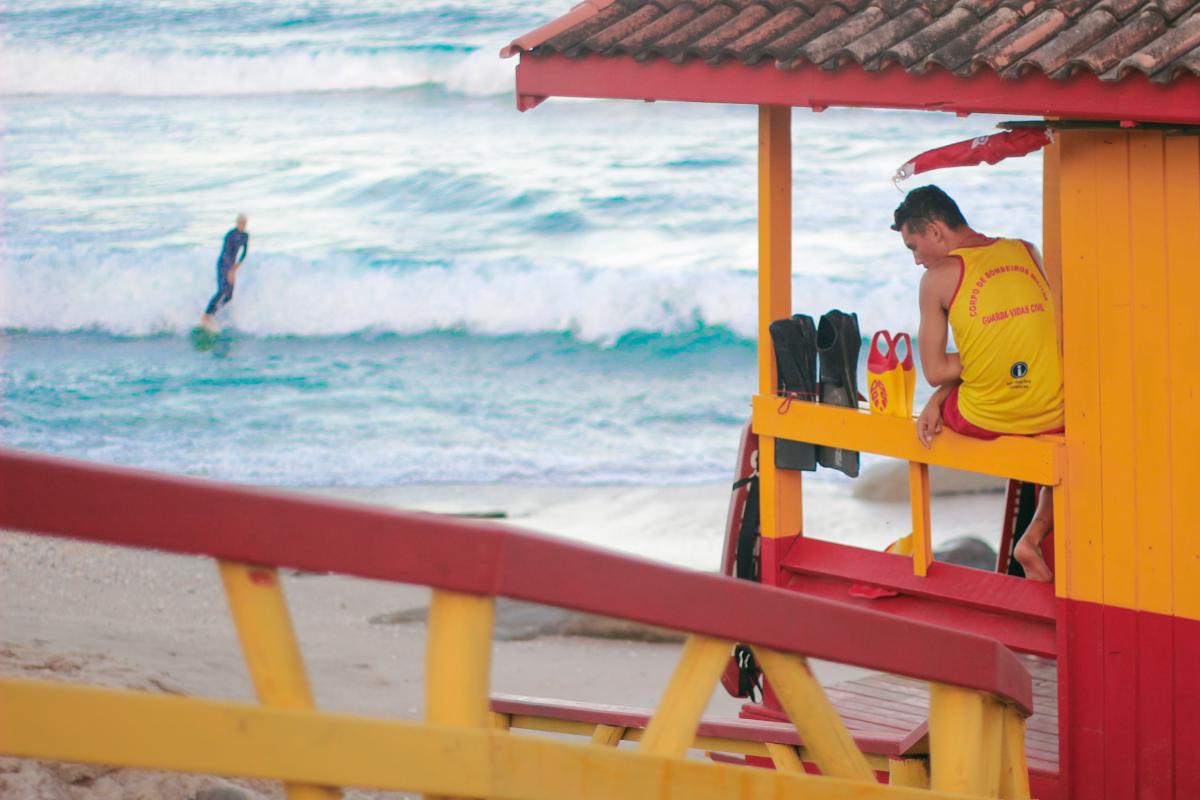There’s a full page colour advertisement for Guernsey in some of the Sunday magazines at the moment. I spent many of my growing-up summers on the north coast of Norfolk and the photograph of the Guernsey beach brought back many memories, not all of them fond.
Judging by the shadows, it’s getting late in the evening. No one is swimming but there are two distant people tentatively standing at the water’s edge, both seemingly well-covered. There’s a brisk breeze coming in from the sea; you can tell that from a few white-capped waves and the fact that all the windbreaks (and there are at least six) are positioned between the sea and their owners, thus not only providing them with welcome shelter but also cutting them off from the view.
No one is sunbathing. There are a couple of umbrellas but neither stands upright; they lie on their sides, as if blown there by the wind. Some people seem to be wearing woollies. The headline reads: `Guernsey. Rediscover what life’s about.'
Literal media literacy
From about the age of four, most of us come to realise that most advertisements seem to be strongly in favour of that which is being advertised. I don’t remember parents or teachers telling me, let alone warning me, of this dangerous bias.
However, judging by their unfortunate paper of October 2011, The Public Interest Research Centre (PIRC) and the World Wildlife Fund-UK (WWF) would like all advertisements, in all media, to carry a prominent disclaimer along these lines:
‘Caution: You are looking at an advertisement. You should know that its intention is to encourage you to do something, and/or spend money, that you might otherwise not have done or spent. Its facts and arguments lack objectivity and balance. Product deficiencies go unmentioned, as do competitive products which in certain respects might prove superior. Language and visual representation will have been deliberately chosen to make the product seem as desirable as possible, often stretching the truth as far as possible within the constraints of regulation and the law. Be on the look-out for implication and irrelevant association. When interpreting this advertisement, as with all advertisements, it is wise to consciously apply scepticism.’
Even without such helpful guidance, that’s more or less what everyone over the age of four actually does. We take it for granted that ads speak well of the merchandise advertised and assume that their language and visual representation have been deliberately chosen to make their products seem as desirable as possible. We often admire the skill and the style with which it’s all done.
And that’s what I find so disconcerting about the ad for Guernsey.
Instinctively, I start by assuming that, within the constraints of regulation and the law, all the devious adman’s skills and ruses have been employed to make Guernsey as desirable a holiday destination as possible. So, as with all advertisements, I decode downwards, aiming off for gloss and hyperbole.
Having never been to Guernsey, I’ve got no idea of this ad’s relationship to reality. But if all the normal, devious adman’s skills have indeed been employed; if this is the most positive interpretation that can indeed be contrived; if the actuality of this Guernsey beach is in truth several degrees less appealing than its depiction: then it doesn’t suggest an agreeable experience.
This is not, of course, to say that the ad is a false representation of a Guernsey beach. It may very well be an entirely accurate representation of a Guernsey beach; but given the conventions of advertising and how advertising is decoded, who will be certain? The advertising trade is constantly being urged to be more realistic; to portray life as she really is. This Guernsey advertisement is almost certainly an outstanding example of how an utterly truthful advertisement can be seriously misleading.
Taken at face value (which hardly anyone will) the ad would undoubtedly appeal, and deservedly so, to millions of British families; families who hate excessive sun, enjoy beach cricket, don’t want to spend too long in the sea, don’t want to struggle with an unfamiliar language, like proper sand and dislike airports.
I just hope that not too many of those families will be discouraged from taking what would almost certainly have been exactly the holiday they wanted because the advertisement that had attracted them told the truth.
There remains the possibility, of course, that all the usual hyperbole was indeed applied; that in order to arrive at this modestly appealing landscape, talented teams of unprincipled wordsmiths, spin-meisters and cosmeticians were indeed expensively employed.
Should that be the case, and remembering again my own bleak childhood summers on the north coast of Norfolk, I find the Guernsey pay-off line final evidence of a regrettable honesty: Discover holidays as they used to be.
Read more from Jeremy. This review was taken from the September issue of Market Leader. Browse the archive here.
